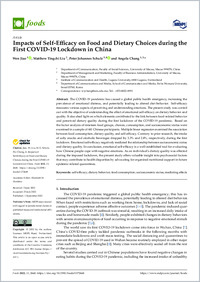Impacts of self-efficacy on food and dietary choices during the first COVID-19 lockdown in China
- Jiao, Wen ORCID Department of Communication, Faculty of Social Sciences, University of Macau, China
- Liu, Matthew Tingchi Department of Management and Marketing, Faculty of Business Administration, University of Macau, China
- Schulz, Peter Johannes ORCID Institute of Communication and Health (ICH), Facoltà di comunicazione, cultura e società, Università della Svizzera italiana, Svizzera - Department of Communications and Media, School of Communication and Media, Ewha Womans University, Seoul, Korea
- Chang, Angela ORCID Department of Communication, Faculty of Social Sciences, University of Macau, China - Institute of Communication and Health (ICH), Facoltà di comunicazione, cultura e società, Università della Svizzera italiana, Svizzera
- 2022
Published in:
- Foods. - 2022, vol. 11, no. 17, p. 2668
English
The COVID-19 pandemic has caused a global public health emergency, increasing the prevalence of emotional distress, and potentially leading to altered diet behavior. Self-efficacy measures various aspects of perceiving and understanding emotions. The present study was carried out with the objective of understanding the effect of emotional self-efficacy on dietary behavior and quality. It also shed light on which elements contributed to the link between food-related behavior and perceived dietary quality during the first lockdown of the COVID-19 pandemic. Based on the factor analysis of nineteen food groups, choices, consumption, and socioeconomic status were examined in a sample of 441 Chinese participants. Multiple linear regression examined the association between food consumption, dietary quality, and self-efficacy. Contrary to prior research, the intake of salty snacks and alcoholic beverages dropped by 3.3% and 2.8%, respectively, during the first lockdown. Emotional self-efficacy negatively mediated the relationship between socioeconomic status and dietary quality. In conclusion, emotional self-efficacy is a well-established tool for evaluating how Chinese people cope with negative emotions. As an individual’s dietary quality was affected during the imposed lockdown, the present study offers valuable insight into psychosocial factors that may contribute to health disparities by advocating for organized nutritional support in future epidemic-related quarantines.
- Collections
- Language
-
- English
- Classification
- Dietetics, nutrition
- License
- Open access status
- gold
- Identifiers
-
- DOI 10.3390/foods11172668
- ARK ark:/12658/srd1325636
- Persistent URL
- https://n2t.net/ark:/12658/srd1325636
Statistics
Document views: 166
File downloads:
- Schulz_2022_MDPI_foods: 160
